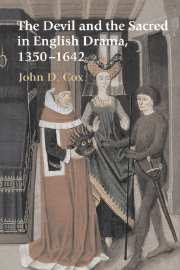Book contents
- Frontmatter
- Contents
- List of illustrations
- Acknowledgments
- Introduction
- 1 Stage devils and oppositional thinking
- 2 The devil and the sacred in the English mystery plays
- 3 Stage devils and sacramental community in non-cycle plays
- 4 Stage devils and early social satire
- 5 Protestant devils and the new community
- 6 The devils of Dr. Faustus
- 7 Reacting to Marlowe
- 8 The devil and the sacred on the Shakespearean stage: theatre and belief
- 9 Traditional morality and magical thinking
- 10 New directions
- Appendix. Devil plays in English, 1350–1642
- Notes
- Index
2 - The devil and the sacred in the English mystery plays
Published online by Cambridge University Press: 22 September 2009
- Frontmatter
- Contents
- List of illustrations
- Acknowledgments
- Introduction
- 1 Stage devils and oppositional thinking
- 2 The devil and the sacred in the English mystery plays
- 3 Stage devils and sacramental community in non-cycle plays
- 4 Stage devils and early social satire
- 5 Protestant devils and the new community
- 6 The devils of Dr. Faustus
- 7 Reacting to Marlowe
- 8 The devil and the sacred on the Shakespearean stage: theatre and belief
- 9 Traditional morality and magical thinking
- 10 New directions
- Appendix. Devil plays in English, 1350–1642
- Notes
- Index
Summary
STAGE DEVILS AND TRADITIONAL RELIGION
The devil's oppositional role in traditional religion is particularly important in understanding the social function of devils on the stage. In E. K. Chambers' view, vernacular drama's recognition of secular problems was impossible for liturgical drama, because it was preoccupied with spiritual and otherworldly concerns. He therefore understood occasional moments of social satire in the mystery plays, often voiced through devils, as evidence of secularity and evolutionary progress. He was right about a sense of opposition in early drama, as we have seen in chapter 1, but the opposition did not involve secular and sacred; rather, it involved God and the devil. Where society was concerned, the devil's opposition defined community by default, illustrating emblematically what community was not by opposing what it was. Just as the devil played this role in countless liturgical celebrations throughout the ritual year, so he plays it in the mystery cycles. As we have them now, these plays are not the earliest drama in English; in some cases, the texts are early sixteenth-century, and a complex palimpsest of influences is discernible in them. Nonetheless, the mystery plays are the closest of early vernacular dramatic forms to ritual, and they therefore represent a perpetuation of traditional religious views until well into Elizabeth's reign, when they ceased playing.
- Type
- Chapter
- Information
- The Devil and the Sacred in English Drama, 1350–1642 , pp. 19 - 38Publisher: Cambridge University PressPrint publication year: 2000



